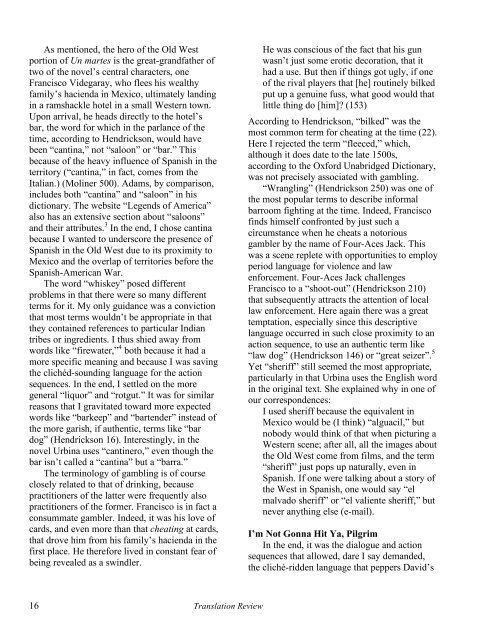table of contents - The University of Texas at Dallas
table of contents - The University of Texas at Dallas
table of contents - The University of Texas at Dallas
Create successful ePaper yourself
Turn your PDF publications into a flip-book with our unique Google optimized e-Paper software.
As mentioned, the hero <strong>of</strong> the Old West<br />
portion <strong>of</strong> Un martes is the gre<strong>at</strong>-grandf<strong>at</strong>her <strong>of</strong><br />
two <strong>of</strong> the novel’s central characters, one<br />
Francisco Videgaray, who flees his wealthy<br />
family’s hacienda in Mexico, ultim<strong>at</strong>ely landing<br />
in a ramshackle hotel in a small Western town.<br />
Upon arrival, he heads directly to the hotel’s<br />
bar, the word for which in the parlance <strong>of</strong> the<br />
time, according to Hendrickson, would have<br />
been “cantina,” not “saloon” or “bar.” This<br />
because <strong>of</strong> the heavy influence <strong>of</strong> Spanish in the<br />
territory (“cantina,” in fact, comes from the<br />
Italian.) (Moliner 500). Adams, by comparison,<br />
includes both “cantina” and “saloon” in his<br />
dictionary. <strong>The</strong> website “Legends <strong>of</strong> America”<br />
also has an extensive section about “saloons”<br />
and their <strong>at</strong>tributes. 3 In the end, I chose cantina<br />
because I wanted to underscore the presence <strong>of</strong><br />
Spanish in the Old West due to its proximity to<br />
Mexico and the overlap <strong>of</strong> territories before the<br />
Spanish-American War.<br />
<strong>The</strong> word “whiskey” posed different<br />
problems in th<strong>at</strong> there were so many different<br />
terms for it. My only guidance was a conviction<br />
th<strong>at</strong> most terms wouldn’t be appropri<strong>at</strong>e in th<strong>at</strong><br />
they contained references to particular Indian<br />
tribes or ingredients. I thus shied away from<br />
words like “firew<strong>at</strong>er,” 4 both because it had a<br />
more specific meaning and because I was saving<br />
the clichéd-sounding language for the action<br />
sequences. In the end, I settled on the more<br />
general “liquor” and “rotgut.” It was for similar<br />
reasons th<strong>at</strong> I gravit<strong>at</strong>ed toward more expected<br />
words like “barkeep” and “bartender” instead <strong>of</strong><br />
the more garish, if authentic, terms like “bar<br />
dog” (Hendrickson 16). Interestingly, in the<br />
novel Urbina uses “cantinero,” even though the<br />
bar isn’t called a “cantina” but a “barra.”<br />
<strong>The</strong> terminology <strong>of</strong> gambling is <strong>of</strong> course<br />
closely rel<strong>at</strong>ed to th<strong>at</strong> <strong>of</strong> drinking, because<br />
practitioners <strong>of</strong> the l<strong>at</strong>ter were frequently also<br />
practitioners <strong>of</strong> the former. Francisco is in fact a<br />
consumm<strong>at</strong>e gambler. Indeed, it was his love <strong>of</strong><br />
cards, and even more than th<strong>at</strong> che<strong>at</strong>ing <strong>at</strong> cards,<br />
th<strong>at</strong> drove him from his family’s hacienda in the<br />
first place. He therefore lived in constant fear <strong>of</strong><br />
being revealed as a swindler.<br />
16 Transl<strong>at</strong>ion Review<br />
He was conscious <strong>of</strong> the fact th<strong>at</strong> his gun<br />
wasn’t just some erotic decor<strong>at</strong>ion, th<strong>at</strong> it<br />
had a use. But then if things got ugly, if one<br />
<strong>of</strong> the rival players th<strong>at</strong> [he] routinely bilked<br />
put up a genuine fuss, wh<strong>at</strong> good would th<strong>at</strong><br />
little thing do [him]? (153)<br />
According to Hendrickson, “bilked” was the<br />
most common term for che<strong>at</strong>ing <strong>at</strong> the time (22).<br />
Here I rejected the term “fleeced,” which,<br />
although it does d<strong>at</strong>e to the l<strong>at</strong>e 1500s,<br />
according to the Oxford Unabridged Dictionary,<br />
was not precisely associ<strong>at</strong>ed with gambling.<br />
“Wrangling” (Hendrickson 250) was one <strong>of</strong><br />
the most popular terms to describe informal<br />
barroom fighting <strong>at</strong> the time. Indeed, Francisco<br />
finds himself confronted by just such a<br />
circumstance when he che<strong>at</strong>s a notorious<br />
gambler by the name <strong>of</strong> Four-Aces Jack. This<br />
was a scene replete with opportunities to employ<br />
period language for violence and law<br />
enforcement. Four-Aces Jack challenges<br />
Francisco to a “shoot-out” (Hendrickson 210)<br />
th<strong>at</strong> subsequently <strong>at</strong>tracts the <strong>at</strong>tention <strong>of</strong> local<br />
law enforcement. Here again there was a gre<strong>at</strong><br />
tempt<strong>at</strong>ion, especially since this descriptive<br />
language occurred in such close proximity to an<br />
action sequence, to use an authentic term like<br />
“law dog” (Hendrickson 146) or “gre<strong>at</strong> seizer”. 5<br />
Yet “sheriff” still seemed the most appropri<strong>at</strong>e,<br />
particularly in th<strong>at</strong> Urbina uses the English word<br />
in the original text. She explained why in one <strong>of</strong><br />
our correspondences:<br />
I used sheriff because the equivalent in<br />
Mexico would be (I think) “alguacil,” but<br />
nobody would think <strong>of</strong> th<strong>at</strong> when picturing a<br />
Western scene; after all, all the images about<br />
the Old West come from films, and the term<br />
“sheriff” just pops up n<strong>at</strong>urally, even in<br />
Spanish. If one were talking about a story <strong>of</strong><br />
the West in Spanish, one would say “el<br />
malvado sheriff” or “el valiente sheriff,” but<br />
never anything else (e-mail).<br />
I’m Not Gonna Hit Ya, Pilgrim<br />
In the end, it was the dialogue and action<br />
sequences th<strong>at</strong> allowed, dare I say demanded,<br />
the cliché-ridden language th<strong>at</strong> peppers David’s

















